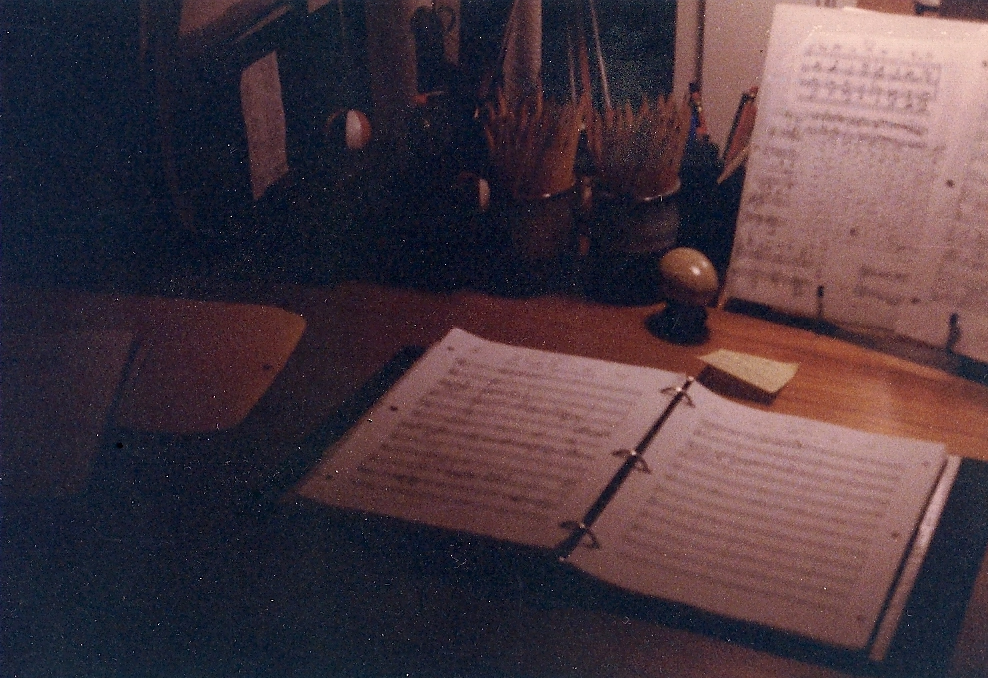and an anonymous correspondent
For CF's Other Works page (with some popular-style songs) CLICK HERE.
In June of 2009 this LinkedIn lead-in appeared:
I composed a lot of songs.. If there's a band here or a singer, you can contact me if you want a sample of my songs.
I responded:
It sounds as though you are a songwriter, not a composer.
To which the individual replied:
Yes - to clarify - songwriters write songs. Composers write symphonies :-) Songwriters have lyrics. Composers have instrumentation. Both write environmental music for film and tv. But composers write scores for film and tv. Elton John – songwriter Mozart - composer....
To which I then replied:
Hm, continuing the discussion, it should be said that composers often write works with lyrics. Before Beethoven, most music was vocal music. With Beethoven and since, a small percentage of composers write mostly instrumental music. Some modernist composers have given up on texts, not because they don't want them, but because the singers who would be singing them are such notoriously bad musicians. Though an unrepentant Modernist, I am not one of these; I continue to write vocal music as though singers were all right (though generally, they're not. It's a career risk for me). Thus, composers do also write songs.
Hollywood "composers" are generally not really composers, especially when operating under the usual contractual obligation to have others do their orchestrations for them, an obligation that has existed for sixty or seventy years, thanks to the machinations of Robert Russell Bennett, the orchestrator who succeeded in inverting the power structure of Hollywood music so that the orchestrators became indispensible... only because the contracts required it. Aaron Copland and Igor Stravinksy were treated so badly by Hollywood, with their music cut up and put in all the wrong orders, that most real composers will not go there. In 1988, when I asked John Williams for a job doing orchestrations for him, he replied "I don't think Hollywood is a place for a serious composer." He was not speaking in false modesty.
A composer creates not only the sounds, which songwriters also do, he creates the very idiom, often down to the smallest harmonic phenomenon or vocal phoneme. Songwriters create new musical situations very, very seldom; almost everything they do is borrowed from somewhere else. Composers do this very seldom.
Writing for orchestra does not make a person a composer. If the methods are those of using sounds used by other songwriters before them, the music is not that of a composer, but of a songwriter. There are exceptions, but generally, film scores are not classical, composed music. They are elaborate instrumental "songs," orchestrated by others, who are not doing creative work. The audience senses this, which is one of the reasons they call almost every musical piece a "song." Such use of the word "song" is widespread but not very coherent.
This brings us to a slightly mindbending fact: if the audience does not hear the composition as a proper composition, there is the chance that it is not one. If you use the Bible as a paperweight, it is not a book. For example, over time, some of Mozart's music has become so familiar that people listen to it misunderstanding that it is supposed to be turbulent when they hear it as jolly, or challenging when they hear it as sweet. When this happens, you have the worst of all possible audiences, and the music fails, through no fault of its own, to be perceived for what it is... and becomes "popular." Popularity is often what a composition achieves in failure. This is one of the chief reasons that classical composers are obliged to create sounds that have "deep" unfamiliarity... The injury is added to insult when classical pieces are put to a rock beat, etc. At this point, the only use such pieces have that resembles the use for which they were intended, is as baby food for people who are ignorant of music. When I was was a musical baby, I listened to such pablum, but when I became a man, I put away such musics. People who listen to such stuff without getting to the real thing are people of arrested development. I listen to popular music but with greater interest in a much, much smaller repertoire of popular artists. I completely avoid some composers who do not deserve to be called such: any minimalists such as Philip Glass, whose music is simply not composerly; or composers like Puccini, who stole everything he wrote; theft is the nature of the popular musician, and Puccini is only in the repertoire because the public is so dismally ignorant.
